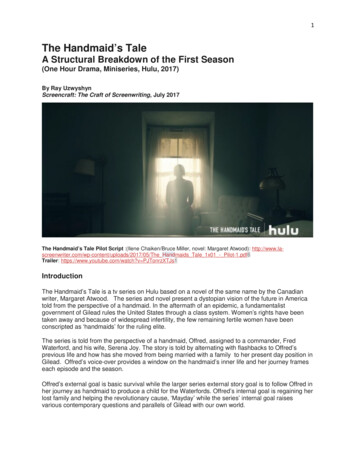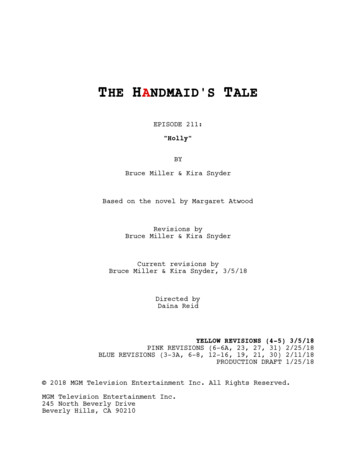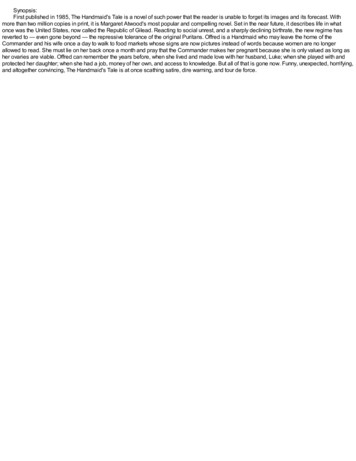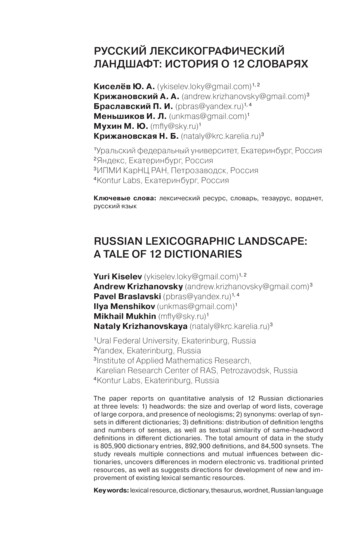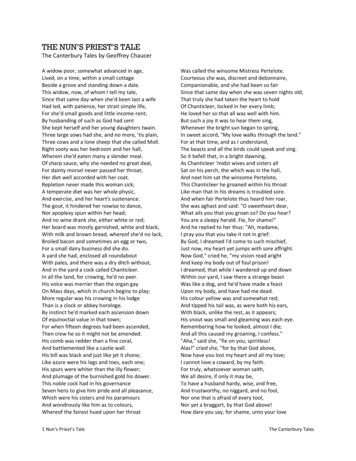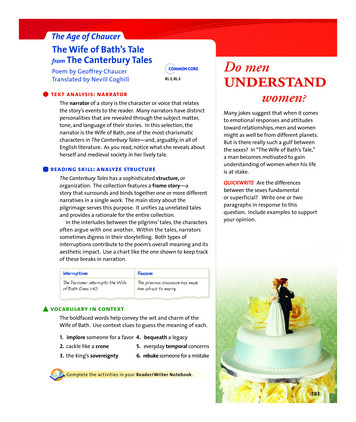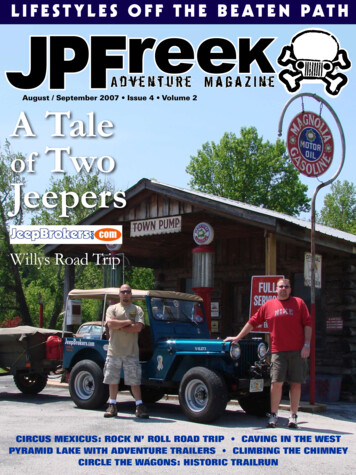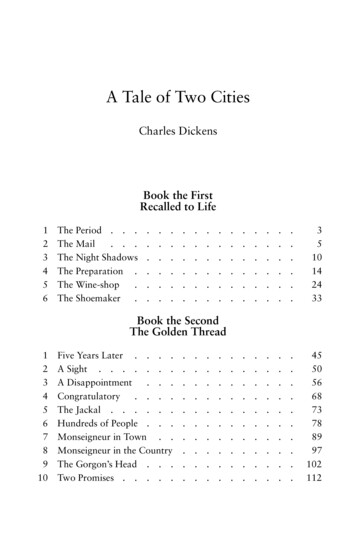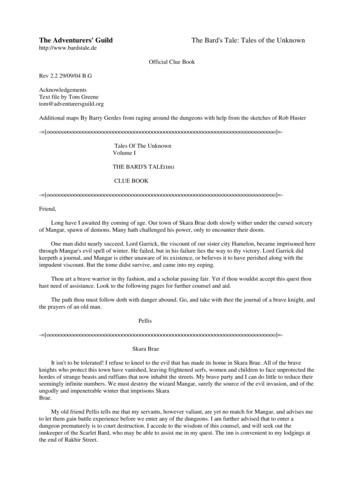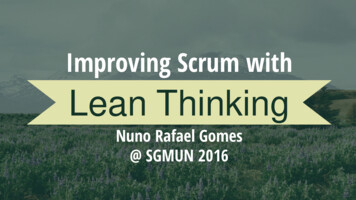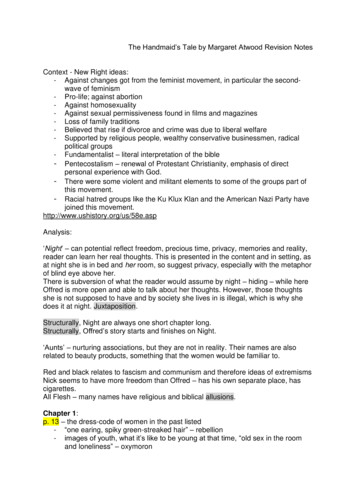
Transcription
The Handmaid‟s Tale by Margaret Atwood Revision NotesContext - New Right ideas:- Against changes got from the feminist movement, in particular the secondwave of feminism- Pro-life; against abortion- Against homosexuality- Against sexual permissiveness found in films and magazines- Loss of family traditions- Believed that rise if divorce and crime was due to liberal welfare- Supported by religious people, wealthy conservative businessmen, radicalpolitical groups- Fundamentalist – literal interpretation of the bible- Pentecostalism – renewal of Protestant Christianity, emphasis of directpersonal experience with God.- There were some violent and militant elements to some of the groups part ofthis movement.- Racial hatred groups like the Ku Klux Klan and the American Nazi Party havejoined this is:„Night‟ – can potential reflect freedom, precious time, privacy, memories and reality,reader can learn her real thoughts. This is presented in the content and in setting, asat night she is in bed and her room, so suggest privacy, especially with the metaphorof blind eye above her.There is subversion of what the reader would assume by night – hiding – while hereOffred is more open and able to talk about her thoughts. However, those thoughtsshe is not supposed to have and by society she lives in is illegal, which is why shedoes it at night. Juxtaposition.Structurally, Night are always one short chapter long.Structurally, Offred‟s story starts and finishes on Night.„Aunts‟ – nurturing associations, but they are not in reality. Their names are alsorelated to beauty products, something that the women would be familiar to.Red and black relates to fascism and communism and therefore ideas of extremismsNick seems to have more freedom than Offred – has his own separate place, hascigarettes.All Flesh – many names have religious and biblical allusions.Chapter 1:p. 13 – the dress-code of women in the past listed- “one earing, spiky green-streaked hair” – rebellion- images of youth, what it‟s like to be young at that time, “old sex in the roomand loneliness” – oxymoron
------“and expectation of something without a shape or name” – not knowing, notunderstanding, too young; reality different from fantasies, unrealisticChange in moodRestriction – “we could not talk”Military language – “in the army cots that had been set up in rows” (rigid),“army issue blankets”,“patrolled” (p. 14)Women are related to children, shows their lack of control, under someone‟sinfluence – “flannelette sheets, like children‟s”, “folded our clothes neatly andlaid them on the stools at the ends of the beds”p. 14 – “they had electric cattle prods slung on thongs from their leather belts”– dehumanisation, control“No guns though, even they could not be trusted with guns.” – shows thedistrust and so position of women in society. Also because handmaids areprecious resources as they are fertile.“two by two” – introduce theme of doubles“enclosed now by a chain-link fence topped with barbed wire” – restriction,military“That was our fantasy” – desperate fantasy, shows the restriction of people.Also shows rebellion as sexual acts against the law. Basic human emotionscontrolled.“we could stretch out your arms and touch each other‟s hand acrossspace lip-read” – signs of rebellion“Alma. Janine. Dolores. Moira. June.” – Their real names are forbidden forthem to use, them sharing their names can be seen as an act of rebellion orthey have not yet been brainwashed enough. June is the only name notmentioned, therefore potentially this is Offred‟s real name.Secretive, quiet, no harsh sounds, intimate, bond between them.Chapter 2:Narrative shift of location. Different from chapter 1 as not night.-p. 17 “A chair, a table, a lamp.” Unfinished list, abrupt, matter of fact.Suicide mention, foreboding atmosphere, foreshadowing, some people cannotlive in that society.“They‟re removed anything you could tie a rope too.”“Wreath” - funeralWindow “only opens partly” and “glass in it is shatterproof.”“no glass, in front of the water-colour picture of blue irises” (blue used to bethe colour of femininity, perhaps more traditional, or it shows how Serena Joyis watching, or that the inevitability that Offred will lose her fertility) (somebeauty is allowed).-“Eye has been taken out” - blankness, blindness, torture imagery-“A return to traditional values.”-“I can ” - showed restrictions, smalls things are blissful
------“Waste not want not. I am not being wasted. Why do I want?” Idiom/saying she is playing with this meaning, rebellion as writing is forbidden.“Flowers are still allowed.” – shows control, restrictions“Think of it as being in the army” – military“Thoughts must be rationed.” – thoughts are controlled or not allowed;remembering memories, which can be painful will make her becomeemotional and less rational, and she wants to survive. “Thinking can hurt yourchances, and I intend to last.”p. 18 “It‟s those other escapes, the ones you can open in yourself” thegovernment is afraid of.Hope – “But a chair, sunlight flowers: these are not to be dismissed. (in toughcircumstances little things are significant and uplifting) I am alive, I live, Ibreath, I put my hand out, unfolded,(freedom) into the sunlight (hope) aprison but a privilege (hope) either/or (no grey area, only black and white,lots of opposites in this book)“The bell that measures time is ringing.” – not able to tell the time, form ofcontrol or dehumanisationComparing the house to a nunnery – irony as here her position is to have sexto provide children to the couple, this concept is based on the Old Testament“there are few mirrors” – mirrors represent individuality, benighted, takes awaya perspective of yourself that others see.“red shoes, flat-heeled” – red is a symbol of sexuality, glamour; flat-heeled isa symbol of purity, non-sexual, practical – oxymoron“the colour of blood, which defines us” – red here can also represent birth, life,menstrual cycle, which is the job of a handmaid“The white wings are too a prescribed issue; they are to keep us from seeing,but also from being seen.” White – innocence, unawareness of “what is goingon”; shows control and restriction, shows protection“I refused to say my” room, act of rebellion“motherly front sitting room” – irony as Serena Joy is not a mother“flowers, red and blue” – symbol of different womenp.19 “round, convex, a pier-glass, like the eye of a fish, and myself in it like adistorted shadow, a parody of something, some fairytale figure in a red cloak,descending towards a moment of carelessness that is the same as danger. ASister, dipped in blood.” Her distortedness may show how the society havebroken her and that she is not what she is used to be, her identity is lost to herand replaced by someone else that she is forced to follow. There is referenceto red-riding hood, again irony as she is not allowed to read and the only thingshe hears is phrases from the Bible. “Sister” is an image of purity and nonsexuality, however the reference to blood contrast this.“carpet for royalty” – her importance to the government“black for Commander” – danger, mystery, dark“blue, for the Commander‟s Wife” – nurturing, freedom (vastness of water,sea)“sitting room” – she takes the word literary – both p. 18 and p.19, irony of thename“dull green” dress of Martha.
---p. 20 Eavesdropping – rebellion, changed of character, eager for news or tobe in company, either bored or lonely, p.21 “Now I long for it. At least it wastalk. An exchange, of sorts. Or we would gossip. The Marthas know things,they talk among themselves, passing the unofficial news from house tohouse.”“It‟s not what you‟d call hard work.”p.21 “make bread so much like flesh. I hunger to touch something, otherthan cloth or wood. I hunger to commit the act of touch.” – rebellion“She would be too afraid. The Marthas are not supposed to fraternize with us.”The government controls who speaks to who. She explains what fraternizemeans, this shows her cleverness and knowledge of books.Tokens for food have pictures of them not words.Chapter 3:- p.22 “daffodils are now fading, and the tulips are opening their cups tulipsare red, a darker crimson” – daffodils could represent the wife and herinfertility while the tulips may represent Offred, especially as we know that redcolour is related to her. Daffodils cannot be red but can be pink.- “The garden is the domain (military) of the Commander‟s Wife.” – she has herown private space, but does not garden in it herself, the Guardian does it forher.- “it‟s something for them to order and maintain and care for.” – they are givensome control- Garden – nature – environment- The “cross-and-star pattern” is “not a challenge” for the Wife – perhaps showsthat she is also bored.- p.23 “Sometimes I think these scarves aren‟t sent to the Angels (ironic namefor soldiers who kill) at all, but unravelled and turned back into balls of yarn, tobe knitted again in their turn. Maybe it‟s just something to keep the Wivesbusy, to give them a sense of purpose (people need purpose to function sothey can be more easily controlled) It‟s good to have small goals (she needsto produce a child, this responsibility is put on her, this is a more difficult taskas in reality, despite the belief in the society, it is not fully dependent on her)that can be easily attained.”- “Yours is a position of honour.” – precious, important, duty, optimistic view- “She wanted me to feel that I could not come into the house unless she saidso.” – control, she is lower than the wife.- “There‟s always a black market (rebellion), there‟s always something that canbe exchanged. She then was a woman who might bend the rules (notfollowing social rules completely, in her former life she fought for moretraditionalist view, now she wants for some power). But what did I have totrade? (rebellion, hope)”- p.25 “Not so good for you either” – they both cannot do their purpose, wives isto take care of the child and the handmaids to produce a child- p. 25-26 “I was disappointed. I wanted, then, to turn her into an older sister amotherly figure, someone who would understand and protect me.” – shewants a relationship, rebellion for her wish, shows the division of classes ofwomen in society- “As for my husband he‟s just that I want that to be perfectly clear. It deathdo us part.” – playing a role, traditionalist (only marry once).
-“I was sounding like that, a voice of a monotone, voice of a doll.” – showscontrol of speech, shows control of though, shows manipulation, shows lackof freedomChapter 4:- p. 27 – “worms, evidence of fertility of the soil, caught by the sun, half dead,;flexible and pink, like lips.”- “black the colour of prestige or a hearse, (coffin/funeral vehicle), and longand sleek” – death and importance linked- She learns names by hearing – she cannot talk to him- p. 27-28 “Low status: he hasn‟t been issued a woman, not even one. Hedoesn‟t rate (importance of genetics): some defect, lack of connection.(usually sign of corrupt government in real life and dystopian fiction) But heacts as if he doesn‟t know this, or care Smells fishy (spy, the Eye)”- “They would serve who only stand and wait” – obedience, control- Aunt Lydia‟s voice is “like the voices of those women who used to teach balletclasses to children” – lack of control, through of as children- “pretending I am a tree” – unnoticed, still; environmental-related thereforeimportant or rare, necessity as trees are need for survival; background,insignificant- p. 29 “accepted greeting” “accepted response” – control what is spoken,religious language- Idea of doubles – the handmaids walk in two while shopping.- “we are well protected already” – idea of safety- “The truth is that she is my spy, as I am hers”- Ofglen is “like a trained pig‟s on its hind legs (and) never said anything thatwas not strictly orthodox” – control of behaviour and speech, dehumanisationduring control- “She may be a real believer, a Handmaid in more than name.” – shows thatnot everyone is a handmaid because of they were forced too- “ravenous for news” – lack of information-p.30 Stop sign has no wordsMilitary/war-related jargonp.31 “They supposed to show respect, because of the nature of our service.”p.32 “like thumbing your nose from behind a fence or teasing a dog with abone held out of reach I enjoy the power, power of a dog bone, passive butthere.” - rebellion, powerChapter 5:- p.33 “The street is almost like a museum, or a street in a model townconstructed to show the way people used to live” – perfection- “This is the heart of Gilead, where the war cannot intrude where nothingmoves” – is the war even real- “Gilead is within you.” – propaganda, brainwashing- p.34 – “Women were not protected then.” – are they more protected now?“Now we walk along the same street and no man shouts obscenities at us,speaks to us, touches us. No one whistles.”- “money I had earned myself. I think about having such control.”- “There is more than one kind of freedom Freedom to and freedom from ”
--p.34-35 “Habits are hard to break.” – how much has Gilead is differentcompare to before?“lettering was painted out names of the shops” – they can‟t read any words –exaggeration of the rule by Atwood“They seemed to be able to choose We were a society dying, said AuntLydia, of too much choice.” – choice can be equalled to freedom, propagandamakes it seem as a negative thing, excuse for so much controlWar impact – lack of oranges, p.37 “meat is expensive”p.36 “swells triumphantly an object of envy and desire showing us whatcan still be done: we too can be saved.” – survival by birth“Now that she‟s the carrier of life, she is closer to death, and needs specialsecurity.”p.37 “The pregnant woman‟s belly is like a huge fruit.”“Not many things are plastic, any more.” – environmentp.38 “It has taken so little time to change our minds, about things like this.”“I used to dress like that. That was freedom.”„westernised‟ (origin
The Handmaid‟s Tale by Margaret Atwood Revision Notes Context - New Right ideas: - Against changes got from the feminist movement, in particular the second-wave of feminism - Pro-life; against abortion - Against homosexuality - Against sexual permissiveness found in films and magazines - Loss of family traditions - Believed that rise if divorce and crime was due to liberal welfare .
